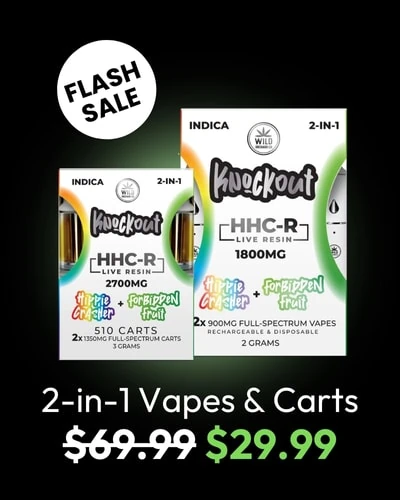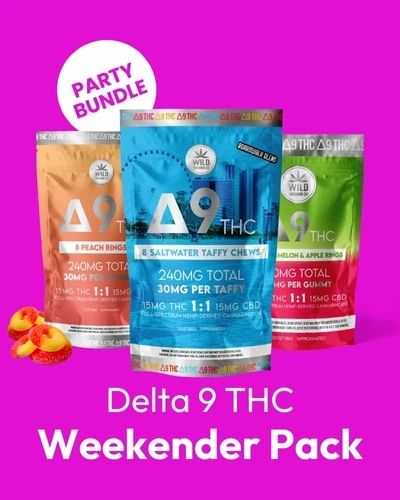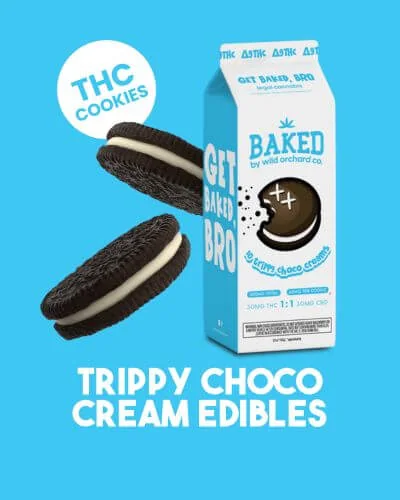Understanding Potency: Delta 9 vs. HHC
When considering whether Delta 9 THC is stronger than HHC, it’s clear that Delta 9 typically offers a more intense psychoactive experience. This cannabinoid is well-known for its potent effects on mood and cognition, making it a popular choice for those seeking robust therapeutic benefits or a deeper recreational high.
On the other hand, HHC provides a gentler onset and a clearer high, ideal for users who prefer maintaining greater mental clarity. Here are some key points to consider:
- Potency Levels: Delta 9 can induce stronger psychoactive effects.
- Impact on the Body: It affects neurological pathways more significantly.
- Duration of Effects: Effects of Delta 9 tend to last longer.
- Consumer Preference: Users desiring milder effects often choose HHC.
- Usage Scenarios: Delta 9 is preferred for intense relief and profound experiences.
Ultimately, the choice between Delta 9 and HHC should be based on personal health goals, desired effects, and legal availability, ensuring the selection aligns with individual needs and local regulations.

Chemical Structure and Potency
Chemical Makeup: The Core Differences Between Delta 9 and HHC
Delta 9 THC is recognized for its strong psychoactive effects compared to HHC. This potency is primarily due to Delta 9’s direct interaction with the brain’s CB1 receptors, which significantly influences mood and perception.
- Chemical Structure: Delta 9 contains a double bond at the 9th carbon chain, intensifying its psychoactive potential.
- Effect Intensity: More profound sensory and emotional effects.
- Interaction with Receptors: Stronger binding affinity with central nervous system receptors.
- Legal Status: Varies more significantly across regions due to its potency.
- User Experience: Often reported to produce more intense experiences.
HHC, while also binding to the same receptors, has a modified molecular structure that results in milder psychoactive effects. This makes it an appealing alternative for those seeking less intense experiences or residing in areas with stricter Delta 9 regulations. Understanding these core differences helps in making an informed choice between Delta 9 and HHC based on personal needs and legal considerations.
How Molecular Structures Influence Strength and Effects
Delta 9 THC generally exhibits greater strength than HHC due to its specific molecular configuration, which enables more effective binding with the brain’s CB1 receptors. This binding directly links to the psychoactive effects contributing to the “high” sensation.
- Delta 9’s molecular structure facilitates tighter interaction with CB1 receptors.
- It exhibits higher psychoactive potency due to efficient receptor activation.
- Its effects typically last longer due to stronger receptor engagement.
- Delta 9 undergoes more intense metabolic interaction within the body.
- Users often report more pronounced sensations and experiences.
The molecular makeup difference between Delta 9 and HHC, though subtle, significantly impacts their effects. Both interact with the same cannabinoid receptors, but Delta 9’s double bond at the 9th carbon atom enhances its potency compared to HHC, whose hydrogenation process slightly alters its receptor interaction. Understanding these molecular distinctions clarifies why Delta 9 generally produces stronger effects than HHC, influencing user preference and legal status across various regions.

Comparing Highs: The Psychoactive Potency of Delta 9 vs. HHC
Delta 9 THC is often regarded as having a stronger psychoactive effect compared to HHC, primarily due to its more direct interaction with the brain’s CB1 receptors. This interaction typically results in more pronounced and intense experiences, including a deeper sense of euphoria and altered perception.
- Intensity of High: Delta 9 THC is known for its potent high, providing deep relaxation and significant mood elevation.
- Euphoria Levels: Typically produces a more intense euphoria, often described as ‘powerful’ by users.
- Mental Clarity: Delta 9 can induce a sense of mental fog, contrasting with HHC’s milder and clearer high.
- Duration of Effects: Delta 9 highs last longer, contributing to its strong reputation.
- Physical Sensations: Often accompanied by more substantial sensory enhancements, such as heightened sounds and colors.
While Delta 9 provides a strong psychoactive experience, HHC serves as a milder alternative. Its effects tend to be less overwhelming, making it preferable for users who seek milder cognitive changes. This attribute makes HHC ideal for those desiring more clarity and functionality while enjoying the benefits of a cannabinoid high.
User Experiences: How Delta 9 and HHC Affect Perception and Mood
Delta 9 THC typically results in a more intense psychoactive high compared to HHC, affecting users’ perception and mood more deeply. Users often report that Delta 9 can significantly alter sensory experiences and emotional states, providing a potent sense of euphoria or relaxation which can be overwhelming for some.
- Impact on Mood: Delta 9 is known for its strong mood-altering effects, capable of inducing profound feelings of happiness or calm.
- Sensory Enhancement: Enhances sensory perceptions such as sight and sound, intensifying experiences.
- Cognitive Effects: Can lead to altered thinking patterns, often making tasks seem more engaging or thoughts more profound.
- Relaxation Levels: Commonly produces a deep relaxation that can verge on sedative, ideal for stress relief.
- Social Interaction: While some find it enhances social interactions by lowering inhibitions, others may experience increased anxiety.
HHC, while also psychoactive, tends to offer a more subdued experience, making it suitable for users seeking less intense cognitive effects and a clearer headspace. Its effects on mood are generally milder, which can be preferable for those new to cannabis or looking for a manageable, more functional high. This makes HHC an appealing option for daytime use or social settings where maintaining greater mental clarity is beneficial.

Legal Status: Is Delta 9 More Regulated Than HHC?
Delta 9 THC is subject to stricter regulations than HHC, mainly due to its well-established psychoactive effects and its classification under federal law. Delta 9, a prominent compound in marijuana, remains regulated under the Controlled Substances Act in the U.S., where it’s classified as a Schedule I drug. This classification applies if the Delta 9 THC content exceeds 0.3% by dry weight in any cannabis product derived from marijuana.
- Federal Guidelines: Under the 2018 Farm Bill, hemp-derived cannabinoids including Delta 9, are legal if the THC concentration does not exceed 0.3%.
- State Regulations: Delta 9 THC is heavily regulated, with varying laws across states that may classify it similarly to recreational or medical marijuana.
- Drug Enforcement: Delta 9 usage can influence drug testing results, leading to legal consequences such as fines or incarceration.
- Medical Use: In states with medical cannabis laws, Delta 9 usage is regulated and can be legally prescribed.
HHC, however, occupies a more ambiguous legal space. Often derived from hemp through chemical processes, HHC is not explicitly mentioned in many state or federal regulations, leading to a grey area in its legal status. While not as potent as Delta 9, HHC offers milder psychoactive effects, which may not be detected in standard drug tests, making it a popular alternative among users seeking similar benefits without the legal risks associated with cannabis.

Safety Comparison: Which Is Safer for Regular Use, Delta 9 or HHC
When comparing the safety of Delta 9 THC and HHC for regular use, it’s crucial to understand their effects and the extent of research available. Widely studied, Delta 9 is known for its potent psychoactive effects, which can be too intense for some, potentially leading to anxiety or paranoia in sensitive individuals. Conversely, HHC, though less researched, receives reports from many users of a milder, more manageable high, suggesting a safer profile for regular use.
- Research on Delta 9 benefits from extensive scientific backing, enhancing our understanding of its risks and benefits.
- Often considered stronger, Delta 9 may pose higher risks for cognitive and psychological effects.
- Many report that HHC’s effects are milder, potentially reducing the risk of negative psychoactive experiences.
- Delta 9’s legal status is more defined, which means products are more likely to be regulated for safety.
- The lesser amount of data on HHC means its safety profile is less understood, which could be a concern for regular users.
The popularity of HHC as an alternative to Delta 9 lacks the robust research that supports Delta 9’s effects. While HHC seems safer for those sensitive to Delta 9’s strong effects, the limited studies suggest proceeding with caution, especially for regular use. The choice between HHC and Delta 9 should take into account individual reactions and the legality and availability of safe, regulated products.

Market Trends: Popularity and Accessibility of Delta 9 vs. HHC
Delta 9 THC has long dominated the cannabis market due to its potent effects and wide recognition as the primary psychoactive component in marijuana. However, with the evolving cannabis laws and market trends, HHC is gaining traction among users seeking a legal alternative with similar effects. The relative ease of accessing Delta 9 products, particularly in states where cannabis is legal, contrasts with the more limited availability of HHC, which is often sold online and in select dispensaries.
- Popularity Trends: Delta 9 continues to be a staple in established markets due to its well-documented effects and broad acceptance.
- Legal Accessibility: In states with legal cannabis, Delta 9 products are readily available in various forms.
- Emerging Alternatives: HHC’s emergence caters to users in areas with stricter THC laws, offering a comparable yet legally distinct option.
- Market Adaptability: HHC’s rise reflects shifting consumer demand towards novel cannabinoids with familiar effects.
- Consumer Choice: Accessibility varies significantly, with Delta 9 being more ubiquitous in dispensaries, while HHC finds a niche market online.
HHC benefits from its gray legal status, reaching consumers in areas with strict cannabis laws. Market response shows a growing interest in alternatives to traditional THC, driven by legal limits and curiosity about cannabinoid effects. As laws change and research grows, the popularity and accessibility of both Delta 9 and HHC may mirror new consumer trends and legal contexts.

F.A.Qs
Is Delta 9 stronger than HHC?
Yes, Delta 9 tends to be stronger than HHC because it has a higher affinity for the brain’s CB1 receptors, leading to more pronounced psychoactive effects.
What cannabinoid is stronger than delta-9?
THC, specifically Delta-9 THC, is considered one of the strongest cannabinoids available, surpassing others in potency and psychoactive effects.
What gets you higher delta-8 or HHC?
Delta-8 usually provides a milder high compared to HHC, which is closer in effect to Delta-9 THC but generally offers a clearer experience.
Is delta 10 stronger than HHC?
No, Delta 10 is typically less potent than HHC, offering a lighter psychoactive experience.
Which is stronger delta-8 or Delta-9?
Delta-9 is stronger than Delta-8, producing more significant psychoactive and therapeutic effects.
How do users typically feel after using HHC?
Users often report feeling a mild high with fewer cognitive impairments, making HHC popular for those who want fewer side effects.

Therapeutic Benefits: Analyzing the Effectiveness of Delta 9 and HHC
Delta 9 THC, known for its potent therapeutic effects, effectively treats chronic pain, enhances mood, and aids sleep. Researchers highlight its utility in managing chronic pain, anxiety disorders, and insomnia, attributing these benefits to its interaction with the body’s endocannabinoid system. This interaction significantly alters mood and perception, enhancing Delta 9’s therapeutic value.
- Pain Management: Medical cannabis prescriptions often favor Delta 9 for its ability to alleviate chronic and acute pain effectively.
- Mood Enhancement: It consistently improves mood and reduces symptoms of depression and anxiety.
- Sleep Aid: Delta 9 is well-known for its sleep-inducing qualities, making it helpful in combating insomnia and other sleep disorders.
- Appetite Stimulation: Especially beneficial for patients undergoing treatments like chemotherapy, it stimulates appetite effectively.
- Neuroprotective Properties: Ongoing research suggests that Delta 9 may offer neuroprotective benefits, potentially aiding in the treatment of neurodegenerative diseases.
HHC, structurally similar to Delta 9, typically delivers milder effects, making it an appealing alternative for those seeking cannabinoid therapeutic benefits without intense psychoactive experiences. HHC’s safety profile remains favorable, with users experiencing fewer anxiety and paranoia episodes. This profile is particularly beneficial for individuals seeking relief without significant cognitive state alterations, allowing use during a broader range of activities and potentially wider acceptance for therapeutic applications.
Pain Relief and Appetite Stimulation: Which Cannabinoid Performs Better?
Delta 9 THC has long been recognized for its robust effects on pain relief and appetite stimulation, often outperforming other cannabinoids in terms of intensity and efficacy. Users consistently report significant alleviation of chronic pain, making it a preferred choice for medical use. Its potent effects also effectively stimulate appetite, aiding those undergoing treatments like chemotherapy in maintaining nutritional health.
- Pain Relief: Effectively reduces various types of pain, including neuropathic and inflammatory pain.
- Appetite Stimulation: Significantly increases appetite, proving useful in clinical settings.
- Rapid Onset: Users often feel effects quickly, providing timely relief.
- Lasting Impact: Benefits such as pain relief and increased appetite can last several hours.
- Broad Use: Healthcare professionals recognize and prescribe it for its therapeutic benefits.
HHC generally delivers milder effects compared to Delta 9. It provides moderate pain relief and less pronounced appetite stimulation, making it suitable for those seeking less intense effects. Users also note a clearer mental state after consuming HHC, an advantage for those looking to maintain more normalcy in their daily activities.

Final Thoughts: Weighing the Benefits of Delta 9 THC and HHC
When choosing between Delta 9 THC and HHC, consider their distinct benefits based on personal health goals and preferences. Delta 9 stands out for its strong psychoactive effects, making it a favorite for those seeking intense sensations and therapeutic benefits, such as significant pain relief and appetite enhancement.
- Strong Psychoactive Effects: Delta 9 consistently delivers a potent high.
- Therapeutic Uses: It effectively manages pain and stimulates appetite.
- Medical Recognition: Medical cannabis programs widely recognize it.
- Preference for Intensity: It is the preferred choice for those seeking stronger effects.
- Regulatory Status: Stricter regulations affect its availability and legal use.
HHC, while structurally similar to Delta 9, typically offers a milder experience. This cannabinoid suits users seeking less intense psychoactive effects and a clearer head after use, ideal for daytime activities where functionality is necessary. HHC is gaining popularity due to its legal status in areas where traditional THC products face restrictions, providing a lawful alternative with beneficial effects.

 Flash Sale
Flash Sale  Party Bundle
Party Bundle  Back in Stock!
Back in Stock! 










